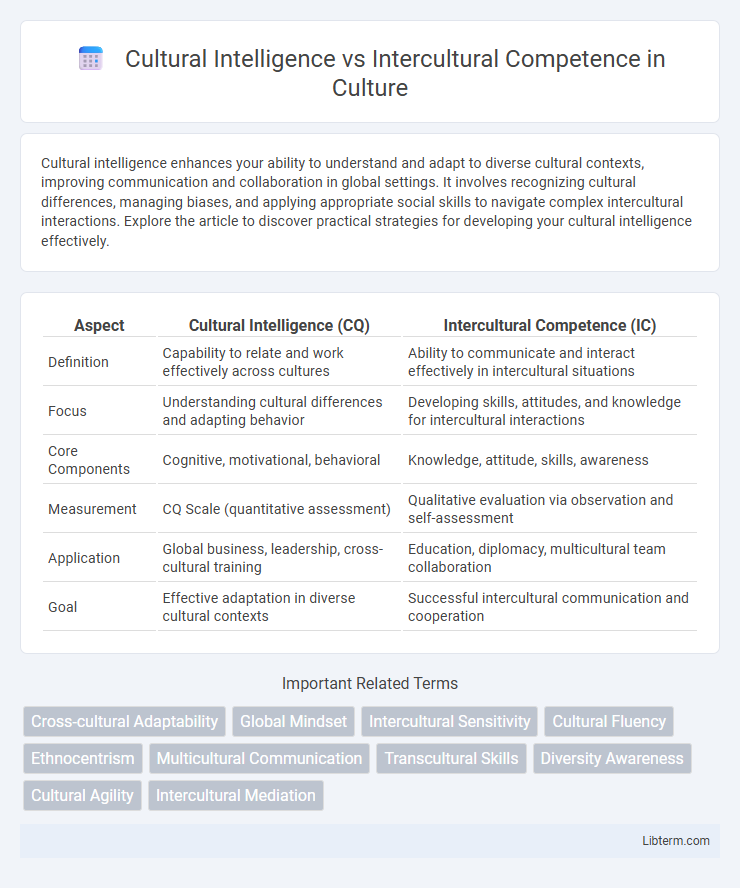Cultural intelligence enhances your ability to understand and adapt to diverse cultural contexts, improving communication and collaboration in global settings. It involves recognizing cultural differences, managing biases, and applying appropriate social skills to navigate complex intercultural interactions. Explore the article to discover practical strategies for developing your cultural intelligence effectively.
Table of Comparison
| Aspect | Cultural Intelligence (CQ) | Intercultural Competence (IC) |
|---|---|---|
| Definition | Capability to relate and work effectively across cultures | Ability to communicate and interact effectively in intercultural situations |
| Focus | Understanding cultural differences and adapting behavior | Developing skills, attitudes, and knowledge for intercultural interactions |
| Core Components | Cognitive, motivational, behavioral | Knowledge, attitude, skills, awareness |
| Measurement | CQ Scale (quantitative assessment) | Qualitative evaluation via observation and self-assessment |
| Application | Global business, leadership, cross-cultural training | Education, diplomacy, multicultural team collaboration |
| Goal | Effective adaptation in diverse cultural contexts | Successful intercultural communication and cooperation |
Defining Cultural Intelligence
Cultural Intelligence (CQ) refers to an individual's capability to function effectively across various cultural contexts, encompassing cognitive, motivational, and behavioral components. It involves understanding cultural norms, values, and practices while adapting one's communication and behavior accordingly. Defining CQ emphasizes the ability to analyze unfamiliar cultural situations and respond with cultural sensitivity and flexibility.
Understanding Intercultural Competence
Intercultural competence involves the ability to effectively navigate and communicate across diverse cultural contexts by combining knowledge, skills, and attitudes. It emphasizes practical application, emotional intelligence, and adaptability to foster mutual respect and productive interactions. Understanding intercultural competence requires recognizing cultural nuances and developing empathy to bridge cultural differences in real-world scenarios.
Key Differences Between Cultural Intelligence and Intercultural Competence
Cultural Intelligence (CQ) refers to an individual's capability to function and manage effectively in culturally diverse settings, emphasizing cognitive, motivational, and behavioral aspects. Intercultural Competence (ICC) involves the ability to communicate appropriately and effectively with people from different cultures, focusing on skills, knowledge, and attitudes needed for successful intercultural interactions. The key difference lies in CQ's measurement of adaptability and problem-solving across cultures versus ICC's emphasis on ethical communication and relationship-building within specific cultural contexts.
Core Components of Cultural Intelligence
Cultural Intelligence (CQ) encompasses cognitive, motivational, and behavioral components that enable individuals to effectively navigate and adapt to diverse cultural contexts. The cognitive aspect involves understanding cultural norms, practices, and conventions, while the motivational component drives interest and confidence in cross-cultural interactions. Behavioral CQ translates this knowledge and motivation into appropriate verbal and non-verbal actions that enhance intercultural communication and collaboration.
Essential Elements of Intercultural Competence
Intercultural competence encompasses essential elements such as cultural awareness, effective communication skills, and adaptability to diverse cultural contexts, enabling individuals to interact respectfully and efficiently across cultures. Unlike cultural intelligence, which measures cognitive, motivational, and behavioral aspects related to cultural understanding, intercultural competence emphasizes practical skills and attitudes crucial for real-world interactions. Key components include empathy, open-mindedness, and the ability to interpret cultural cues correctly, fostering meaningful cross-cultural exchanges.
Measurement and Assessment Approaches
Cultural Intelligence (CQ) is measured using standardized assessments like the Cultural Intelligence Scale (CQS), which evaluates cognitive, motivational, and behavioral dimensions through self-reported surveys and situational judgment tests. Intercultural Competence (IC) assessment often employs performance-based methods, such as simulations, direct observations, and reflective portfolios, emphasizing practical skills and adaptive communication in diverse cultural contexts. Both approaches integrate quantitative and qualitative data but differ in focus: CQ centers on psychological capabilities, whereas IC emphasizes demonstrated intercultural behaviors and skills.
Applications in Global Workplaces
Cultural intelligence (CQ) and intercultural competence both enhance effectiveness in global workplaces by enabling employees to understand, respect, and adapt to diverse cultural norms and communication styles. CQ focuses on the capability to function across cultural settings through cognitive, motivational, and behavioral dimensions, improving teamwork, leadership, and conflict resolution in multinational companies. Intercultural competence emphasizes practical skills and attitudes for meaningful interaction and collaboration, essential for managing cross-border projects and fostering inclusive organizational cultures.
Benefits of Developing Both Skills
Developing both cultural intelligence and intercultural competence enhances effective communication and collaboration in diverse environments by improving adaptability and reducing misunderstandings. These skills foster inclusive leadership and global teamwork, driving innovation and business success in multicultural settings. Mastery of cultural intelligence combined with intercultural competence supports stronger relationships and strategic decision-making across international markets.
Challenges in Building Cultural Intelligence and Intercultural Competence
Building cultural intelligence involves overcoming challenges such as overcoming ethnocentrism, navigating ambiguous social cues, and adapting communication styles across diverse cultural contexts. Intercultural competence requires managing misunderstandings rooted in differing cultural norms, developing empathy, and sustaining open-mindedness amid conflicting values. Both demand continuous learning, self-awareness, and active engagement in diverse environments to effectively bridge cultural gaps and foster meaningful interactions.
Strategies for Enhancing Cultural and Intercultural Abilities
Enhancing cultural intelligence involves strategies such as continuous self-assessment, immersive cultural experiences, and targeted training programs that emphasize emotional and cognitive adaptability. Intercultural competence development focuses on active listening, empathy building, and practicing effective communication techniques tailored to diverse cultural norms. Both approaches benefit from reflective practice and feedback mechanisms to foster deeper understanding and successful cross-cultural interactions.
Cultural Intelligence Infographic

 libterm.com
libterm.com